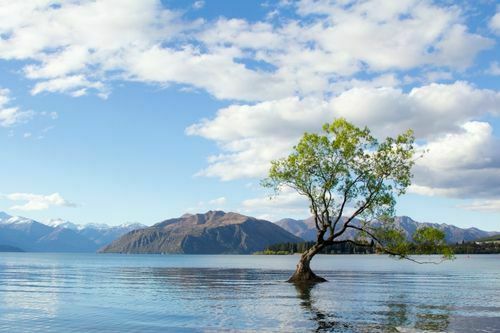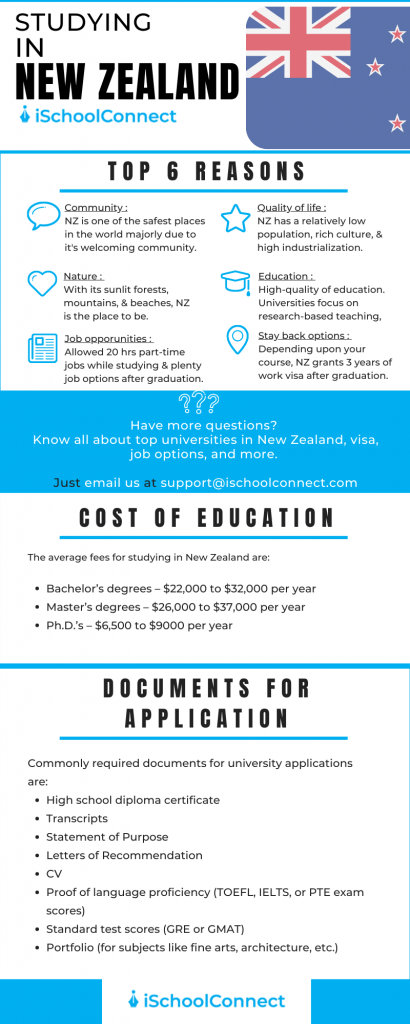Table of Contents
New Zealand might seem like a small island in the Pacific ocean, but it’s so much more than that. Ranking high on the Global Peace Index, New Zealand offers a relaxed lifestyle and a perfect balance between modern life and beautiful nature. Not only that, but it also has a thriving economy. The country is known for its unique, hands-on learning approach and the opportunities it offers to international students. This is why all the eight universities in New Zealand rank amongst the top 500 institutes of the world. But these are not the only reasons you should be thinking about studying in New Zealand.
Why study in New Zealand?

Nature
You will find that every day in New Zealand is an adventure. Its sunlit forests, snow-capped mountains, sandy beaches, and calm lakes will call out to you. And you could explore their beauty through a variety of activities, like bungee jumping, hiking, or cycling.
Education
The New Zealand education system is about hands-on learning. The quality standard of education is kept in check by the New Zealand Qualifications Authority (NZQA). The authority ensures that universities focus on research-based teaching, educate students to work both individually and in groups, and comply with qualifications standards.
Read More: Top 10 reasons to study in New Zealand in 2023
Quality of life
New Zealand is the size of the UK or Japan but has a population of only 5 million people. The country gives its residents room to breathe. So, you can relax and enjoy everything the cities have to offer, be it music and theater, or free festivals and international sports events. And if you choose to hang out with your friends at a cafe or a restaurant, you can do that too
Community
Since New Zealand was ranked 2nd on the Global Peace Index in 2019, it is deemed as one of the safest and friendliest places in the world. The community here is warm, welcoming, and friendly. So, when you get there, you will feel included and respected.
Job opportunities
One of the great things about studying in New Zealand is that you can work 20 hours a week during your semesters, and full-time during breaks. This will not only help you cover your expenses but also allow you to acquire the skills you need for your career. After you graduate, you can easily apply for a post-study work visa and stay for another 3 years in New Zealand.
Top universities in New Zealand
There are several types of higher education organizations in New Zealand. These include polytechnics, private institutes, colleges, training establishments, and technology institutes. All of them make sure that they provide a hands-on learning experience.
But most importantly, New Zealand has 8 state-funded universities. And all of them rank amongst the top 500 universities in the QS World Rankings-

- University of Auckland
- University of Otago
- Victoria University of Wellington
- University of Canterbury
- University of Waikato
- Massey University
- Lincoln University
- Auckland University of Technology
- This stands to show that NZQAs research-based, hands-on learning education standards are working.
What is the New Zealand education cost?
New Zealand ranks as the least corrupt country in the world. This means that it is known for its transparency. Why am I bringing this up here?
Well, the official government website for studying in New Zealand has a list of all 8 universities and their course-wise fees on a single page (which is so transparent!). With a single glance at it, you can tell how much your program will cost you.
But to sum it up here –
- Bachelor’s degrees – $22,000 to $32,000 per year, with higher fees for subjects like medicine and veterinary science
- Master’s degrees – $26,000 to $37,000 per year, with higher fees for subjects like medicine and veterinary science
- Ph.D.’s – $6,500 to $9000 per year
However, I should point out that these are not official fees. They are indicative of what your tuition could be. But these figures are pretty close to the actual fees you will be charged.
Coming to the cost of living in New Zealand. It will depend on your lifestyle and which part of the country you live in. This is why each university recommends a different range of funds. This amount can vary between $15,000 (University of Otago) and $25,000 (University of Auckland). If you’re planning to study in New Zealand for less than a year, it is recommended that you have at least $1,250 for each month of your stay.
In order to reduce your overall cost of studying in NZ, you can always work part-time, for 20 hours a week, or apply for a scholarship.

What are the New Zealand admission requirements?
Like most countries, New Zealand does not have a centralized application system. So, once you’ve shortlisted the universities you want to apply to, you will have to go through their websites and find out the admission requirements. However, a few common requirements for studying in New Zealand.
For an undergraduate course, you will need to provide –
- A high school diploma
- Proof of language proficiency in English
For students pursuing a postgraduate degree, universities ask students to submit –
- Transcripts
- Statement of Purpose
- Letters of Recommendation
- CV
- Proof of language proficiency (TOEFL, IELTS, or PTE exam scores)
- Standard test scores (GRE or GMAT)
- Portfolio (for subjects like fine arts, architecture, etc.)
I suggest you start preparing these documents 6 months before you have to apply. After you submit your application, it is time to wait. If shortlisted, you will receive a letter of acceptance, which you can then use to apply for a student visa (and even a scholarship)!
How to get a student visa for New Zealand?
You will need a student visa if you are taking up a full-time course in New Zealand that will last for longer than 3 months. Using it, you can attend university, work 20 hours per week during your semesters, and do a full-time job over the holidays.
The documents needed to apply for a New Zealand student visa are –
- An offer of place from an approved education provider
- Evidence that you have enough money to pay your tuition fees
- Your passport and acceptable passport-style photo(s)
- Tuition fees evidence
- Proof of funds – $15,000 per year to cover your living expenses
- A copy of your air ticket home, or proof that you have enough money to buy one
- An accommodation guarantee, if you’re under 18
- The New Zealand student visa fee, which is around $57
- You may also be asked to provide a medical certificate, a chest x-ray, and a police certificate
Generally, it takes up to 8 weeks for your visa to be processed. And it might take longer than that in case more information is needed.
The New Zealand government asks for you to share some supporting documents, like a cover letter and a Statement of Purpose explaining why you want to study there, which will help them make a decision faster.
What about job opportunities after studying in New Zealand?
New Zealand has always welcomed people with skills. Companies in Auckland, Marlborough, or West coast have several job openings in sectors such as health, media, law, engineering, and IT. There are also opportunities for people with skills in trades and business services.
And the most interesting thing is this – you will find a list of Essential Skills in Demand on the New Zealand government website. And if your skill set falls in one of these categories, you can be sure of getting a job there. This will also increase your chances of getting a visa.
And even if you don’t find your skillset on the list, you can head to websites like Working In, Workhere, or New Kiwis, get yourself a job and apply for your work visa.
So, should I study in New Zealand?
If I were you, I’d totally go to New Zealand. I mean, it’s beautiful, relaxing, has a country vibe, and at the same time, it is developed. The government ensures quality education, the people are welcoming, and you will have a fair chance of staying back if you want to.
Let us know what you think in the comments section.







I have done my email
I’m sorry?